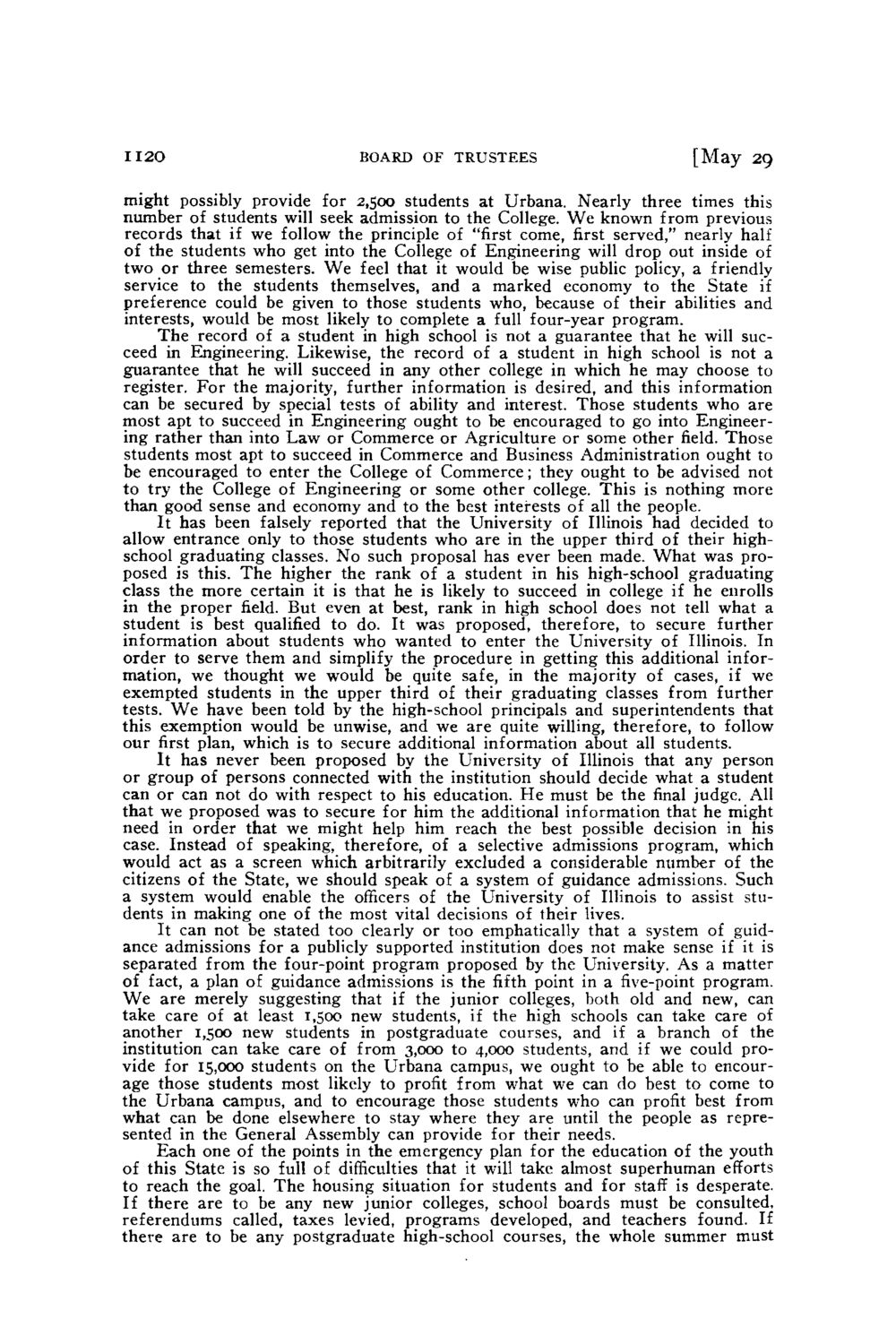| |
| |
Caption: Board of Trustees Minutes - 1946
This is a reduced-resolution page image for fast online browsing.

EXTRACTED TEXT FROM PAGE:
II20 BOARD OF TRUSTEES [May 29 might possibly provide for 2,500 students at Urbana. Nearly three times this number of students will seek admission to the College. W e known from previous records that if we follow the principle of "first come, first served," nearly half of the students who get into the College of Engineering will drop out inside of two or three semesters. W e feel that it would be wise public policy, a friendly service to the students themselves, and a marked economy to the State if preference could be given to those students who, because of their abilities and interests, would be most likely to complete a full four-year program. T h e record of a student in high school is not a guarantee that he will succeed in Engineering. Likewise, the record of a student in high school is not a guarantee that he will succeed in any other college in which he may choose to register. F o r the majority, further information is desired, and this information can be secured by special tests of ability and interest. Those students who are most apt to succeed in Engineering ought to be encouraged to go into Engineering rather than into Law or Commerce or Agriculture or some other field. Those students most apt to succeed in Commerce and Business Administration ought to be encouraged to enter the College of Commerce; they ought to be advised not to try the College of Engineering or some other college. This is nothing more than good sense and economy and to the best interests of all the people. It has been falsely reported that the University of Illinois had decided to allow entrance only to those students who are in the upper third of their highschool graduating classes. No such proposal has ever been made. W h a t was proposed is this. T h e higher the rank of a student in his high-school graduating class the more certain it is that he is likely to succeed in college if he enrolls in the proper field. But even at best, rank in high school does not tell what a student is best qualified to do. It was proposed, therefore, to secure further information about students who wanted to enter the University of Illinois. In order to serve them and simplify the procedure in getting this additional information, we thought we would be quite safe, in the majority of cases, if we exempted students in the upper third of their graduating classes from further tests. W e have been told by the high-school principals and superintendents that this exemption would be unwise, and we are quite willing, therefore, to follow our first plan, which is to secure additional information about all students. It has never been proposed by the University of Illinois that any person or group of persons connected with the institution should decide what a student can or can not do with respect to his education. H e must be the final judge. All that we proposed was to secure for him the additional information that he might need in order that we might help him reach the best possible decision in his case. Instead of speaking, therefore, of a selective admissions program, which would act as a screen which arbitrarily excluded a considerable number of the citizens of the State, we should speak of a system of guidance admissions. Such a system would enable the officers of the University of Illinois to assist students in making one of the most vital decisions of their lives. It can not be stated too clearly or too emphatically that a system of guidance admissions for a publicly supported institution does not make sense if it is separated from the four-point program proposed by the University. As a matter of fact, a plan of guidance admissions is the fifth point in a five-point program. W e are merely suggesting that if the junior colleges, both old and new, can take care of at least 1,500 new students, if the high schools can take care of another 1,500 new students in postgraduate courses, and if a branch of the institution can take care of from 3,000 to 4,000 students, and if we could provide for 15,000 students on the Urbana campus, we ought to be able to encourage those students most likely to profit from what we can do best to come to the Urbana campus, and to encourage those students who can profit best from what can be done elsewhere to stay where they are until the people as represented in the General Assembly can provide for their needs. Each one of the points in the emergency plan for the education of the youth of this State is so full of difficulties that it will take almost superhuman efforts to reach the goal. T h e housing situation for students and for staff is desperate. If there are to be any new junior colleges, school boards must be consulted, referendums called, taxes levied, programs developed, and teachers found. If there are to be any postgraduate high-school courses, the whole summer must
| |